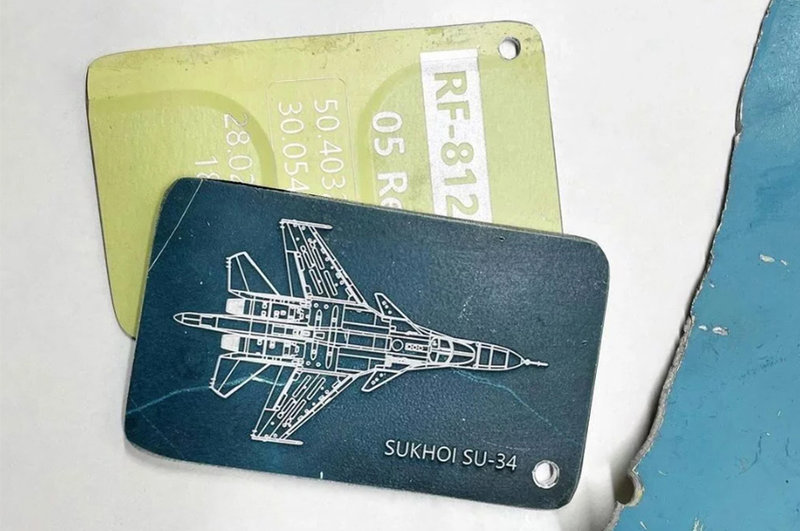Ukraine Crisis
Ukrainians are turning a downed Russian jet into luggage tags
Kirstie Pickering investigates how Recycle Russia is creating luggage tags to raise money for Ukraine’s defenders.
Image: copyright
The Russian invasion of Ukraine has caused the greatest humanitarian crisis in Europe since the Second World War. The United Nations Refugee Agency (UNHCR) believes that as of October 18 2022, the number of refugees that have fled Ukraine since Russia’s invasion is more than 14.33 million, with that sum continuing to rise as war rages on.
The impact on aviation pales in comparison to the unfolding humanitarian crisis but remains significant. According to data published by IATA, the Ukrainian airspace being closed halts movements by air of roughly 3.3% of total air passenger traffic in Europe and 0.8% of total traffic globally compared to 2021.
The US, EU, UK and other countries continue to impose new sanctions on Russian companies and individuals in an attempt to stop the invasion. Financial aid from Western countries to support Ukraine’s defence efforts have also been significant, with the US providing the largest support package – an announcement in August confirmed that the US would commit $2.98bn to train and equip the Ukrainian armed forces for their struggle against the Russian invasion.
Donations for tags
While Western efforts to support Ukraine continue, so too does the fight from the Ukrainian people. Fred Roeder and Maria Semykoz are a German-Ukrainian couple supporting the defenders of Ukraine. Semykoz is from Sievierodonetsk in Donbas, Ukraine, which is currently occupied by Russia. They knew they wanted to support the defenders and collaboratively came up with the idea to launch Recycle Russia.
Recycle Russia turns metal from a Russian SU-34 fighter jet downed in Ukraine into luggage tags. Roeder and Semykoz ask for a $399 donation for Ukraine’s defenders and donors receive a luggage tag as a token of appreciation. Each tag specifies the model of the jet on one side and the date and time of when it was shot down, crash coordinates and the tail number on the other.

The luggage tags show the model of the jet and the coordinates of where it was shot down, as well as the time and date. Credit: Recycle Russia
“The Ukrainian unit that shot down the Russian SU-34 wanted to put this aggressive plane to good use and hence decided to collect the scrap of the plane and turn it into luggage tags,” Roeder tells Airport Technology.
“The donation will be used to purchase non-lethal aid such as surveillance drones and winter clothes for the unit that shot down the plane. Donations are tax-deductible in the US.”
Ukrainian Member of Parliament Maryan Zablotsky secured 60 of the luggage tags. Recycle Russia will use the funds to provide the unit with more drones and other non-lethal supplies.
“In the future, we plan to provide luggage tags made out of Russian cruise missiles that targeted Kyiv,” adds Roeder.
Aviation impact
Those interested in supporting Recycle Russia also have the option to donate $3000 for a drone that will help warn Ukraine’s defenders and civilians about troop movements and military advances. Those that donate the sum for a drone will also receive a luggage tag and the opportunity to name the drone.
Recycle Russia is run by volunteers, with 100% of funds raised going directly towards help for Ukraine. In its previous support initiatives and thanks to the generosity of donors, the organisation has purchased and shipped over 750 thermal cameras, 400 two-way radios, 250 protective vests, 120 helmets, dozens of drones, over 500 summer uniform sets, and many more clothing and outdoor items to Ukraine.
“Ukrainians show massive bravery in holding out against a larger invader,” says Roeder.
People from all over the world should help them to defeat this cruel invasion.
The forecast for the impact of Ukraine’s invasion on aviation is cautious. According to research published in October by the European Organisation for the Safety of Air Navigation (Eurocontrol), air traffic in Europe is not expected to recover to 2019 levels until after 2024. It states that despite strong demand for flights this summer, progress has been held back both by the capacity of the sector to handle the rapid growth and the impact of the war in Ukraine.
The report, which provides a forecast update for European flight movements and service units from 2022-2028, predicts that restrictions on Ukrainian, Russian, Belarusian, and Moldovan airspaces will remain until the end of the horizon in 2028.
It also found that increasing energy prices and the knock-on effect on the purchasing power of consumers will affect travel demand, and the cargo segment will continue to be strongly impacted by the invasion due to the constrained operations of key cargo carriers.